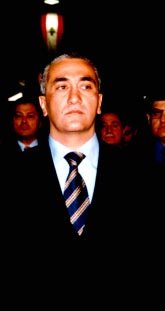

SPECIAL REPORT. Covert CIA program targeting Iran's nuclear program involved those exposed by Bush White House leaks.
Brewster Jennings' targets involved CIA covert program to damage Iran's nuclear infrastructure by altering technical drawings...
The leaking by senior Bush administration officials severely damaged the CIA's counter-proliferation operation aimed at Iran, details of which have been leaked by the Bush administration during its waning days in office.
On May 31, 2006, WMR reported: "the Swiss Federal Prosecutor's Office has complained to the United States that the Bush administration has failed to cooperate with Switzerland's efforts to track the A Q Khan nuclear proliferation network. The Bush administration's multiple refusals to assist Switzerland in probing the Khan network, which was a major target of the CIA's Counter-Proliferation Division, Brewster Jennings Associates, and Valerie Plame Wilson, was revealed by former UN weapons inspector David Albright. Switzerland arrested three members of the Tinner family -- Friedrich, Urs, and Marco -- for illegally supplying centrifuges from a Malaysian company to Libya. Urs Tinner has been rumored to have been a U.S. intelligence asset. Switzerland has received cooperation in its probe from Southeast Asian nations, including Malaysia and Thailand, and South Africa. All three are key transit points for nuclear materials involving Russian-Israeli Mafia assets who, in turn, are linked to top members of the Bush administration, including Vice President Dick Cheney."
On February 19, 2008, WMR followed up on the story: "Since that report, it was discovered from the revelations by former FBI translator Sibel Edmonds that Turkish, Israeli, and Pakistani agents were key members of the nuclear smuggling ring. WMR has now learned from Swiss sources that last November, the Swiss Federal Council, the Bundesrat, passed a secret resolution to destroy critical evidence in the Tinner case. Among the documents ordered destroyed were plans and drawings involving nuclear weapons. The documents had been seized by Swiss prosecutors in their case against the Tinners. WMR has further learned that the Bush administration put pressure on the Swiss to cease their prosecution of the Tinners and destroy all the evidence seized."
It is now apparent from the revelations that the CIA implemented a program to damage nuclear components used in Iran's nuclear program that the Tinners were part of the CIA's efforts and the Bush administration ordered the Swiss to destroy sensitive documents in order to cover up the damage done to the CIA's program by the leak of Valerie Plame Wilson's identity and that of Brewster Jennings and Associates. Special Counsel Patrick Fitzgerald, who has specialized in cover-ups on behalf of successive administrations, ensured that the prosecution of White House officials never went beyond the charges brought against Vice President Dick Cheney's former chief of staff I. Lewis "Scooter" Libby.
WMR has learned from reliable sources that the Swiss government is about to publish a report on the shredding of the Tinner documents. Urs Tinner copied technical drawings for A. Q. Khan in Malaysia. It is believed that the drawings that were copied for Khan were "altered" as part of the CIA's covert program. In addition, the documents shredded in Switzerland likely included technical nuclear drawings from the United States that were also altered by the CIA....
President Bush is reported to have divulged secrets of the CIA's covert program targeting Iran's nuclear program to Israel after he rejected Israeli Prime Minister Ehud Olmert's request to assist Israel in bombing Iran's nuclear facility in Natanz. It is also being reported that the Bush administration has handed off the covert CIA program to the incoming Obama administration, a move that will box Obama into continuing a hostile program aimed at Tehran.
In a January 11, 2009 article in The New York Times, titled U.S. Rejected Aid for Israeli Raid on Iranian Nuclear Site, David Sanger writes that "the covert American program, started in early 2008, includes renewed American efforts to penetrate Iran's nuclear supply chain abroad, along with new efforts, some of them experimental, to undermine electrical systems, computer systems and other networks on which Iran relies. It is aimed at delaying the day that Iran can produce the weapons-grade fuel and designs it needs to produce a workable nuclear weapon."
However, there is evidence that the CIA's program to interfere Iran's nuclear supply chain began much earlier and involved Brewster Jennings and Associates, as well as another CIA front company, Big Black River Technologies, that paid the Tinners' firm in the British Virgin Islands, Traco Group International. Although it is not clear why the New York Times stated the CIA's program began in early 2008, one of Sanger's former Times colleagues, Judith Miller, received the leak about Plame and Brewster Jennings from Libby. Miller is now with the neocon Manhattan Institute and is the subject of an upcoming Hollywood movie, which will make Miller look like a martyr instead of someone who participated in the roll-up of a major CIA counter-proliferation operation.
In addition, a National Intelligence Estimate (NIE) from 2007 stated that Iran halted its nuclear weapons production in 2003 and the CIA's continued program to disable Iran's nuclear program has had just as much effect on its civilian nuclear capabilities as its military capabilities.
Sanger's article states: "to slow progress at Natanz and other known and suspected nuclear facilities, and keep the pressure on a little-known Iranian professor named Mohsen Fakrizadeh, a scientist described in classified portions of American intelligence reports as deeply involved in an effort to design a nuclear warhead for Iran.
Past American-led efforts aimed at Natanz had yielded little result. Several years ago, foreign intelligence services tinkered with individual power units that Iran bought in Turkey to drive its centrifuges, the floor-to-ceiling silvery tubes that spin at the speed of sound, enriching uranium for use in power stations or, with additional enrichment, nuclear weapons.
A number of centrifuges blew up, prompting public declarations of sabotage by Iranian officials. An engineer in Switzerland, who worked with the Pakistani nuclear black-marketeer Abdul Qadeer Khan, had been 'turned' by American intelligence officials and helped them slip faulty technology into parts bought by the Iranians."
The engineer cited by Sanger is Urs Tinner. Project 110 and Project 111, under the control of Fakrizadeh, were the projects to design a nuclear warhead and enable its use with a missile, respectively. The 2007 NIE concluded that work on Projects 110 and 111 ceased in 2003, around the time that the Times and other media outlets participated in the leaking of Valerie Plame Wilson's name, an act that also compromised the Tinners, CIA agents within Iran's nuclear program, Brewster Jennings, and Big Black River.
The Sanger article indicates that the CIA may have salvaged what remained of the Brewster Jennings/Big Black River counter-proliferation and what began in 2008 was a program to disable Iranian centrifuges. Sangr writes: "Some of the efforts focused on ways to destabilize the centrifuges. The details are closely held, for obvious reasons, by American officials. One official, however, said, 'It was not until the last year that they got really imaginative about what one could do to screw up the system.'"
As the Bush administration transitions out of office, the State Department has announced the imposition of sanctions against the A Q Khan nuclear proliferation network, even though the State Department admits it no longer exists. The State Department announcement stated: "While we believe the A.Q. Khan network is no longer operating, countries should remain vigilant to ensure that Khan network associates, or others seeking to pursue similar proliferation activities, will not become a future source for sensitive nuclear information or equipment."
Among those named in the sanctions action are a number of Turkish businessmen and entities that were the focus of both Plame and Edmonds. It is no coincidence that both CIA and FBI operations were compromised on the orders of the neocon cell within the Bush administration that was linked to Turkish and Israeli intelligence.
Those sanctioned are:
Abdul Qadeer Khan -- the father of the Pakistani nuclear bomb and head of the international nuclear proliferation network that involved transfer of nuclear technology to Pakistan, Iran, Libya, North Korea, and Saudi Arabia from a number of nations, including Turkey, Malaysia, South Africa, Spain, Italy, Britain, Dubai, the United States, and Germany.
Selim Alguadis - New Straits Times (Malaysia) identified the Turkish national as "an engineer from Turkey, who was alleged to have supplied electrical cabinets and power supplier-voltage regulator to Libya. Two weeks after the ship BBC China was intercepted in Taranto, Italy, on Oct 4, [2003], Tahir was alleged to have arranged the transshipment of electrical cabinets and power supplier-voltage regulator to Libya through Dubai, on behalf of Selim Alguadis."
EKA Elektronik Kontrol Aletleri Sanayi ve Ticaret AS -- Selim Alguadis' firm.
Buhary Seyed Abu Tahir -- a Sri Lankan national who was linked to several businessmen from Germany, United Kingdom, Switzerland and Turkey, who were believed to be middlemen in the A Q Khan network.
Peter Griffin -- New Straits Times identified him as "a British citizen who had business interest in Dubai [called Gulf Technical Industries - GTI] and currently residing in France. He was alleged to have supplied the layout plan for the machine Shop 1001 as a workshop to enable Libya to produce components for centrifuges. Between 2001 and 2002, Griffin was alleged to have supplied a lathe to Libya for the Machine Shop 1001 Project. Subsequent to that, he arranged to send seven to eight Libyan technicians to Spain, twice, to attend courses on how to operate the machine. At the same time, he was also said to have supplied an Italian-made furnace to Libya for the workshop."
Paul Griffin -- Peter Griffin's son, a co-owner of Gulf Technical Industries (GTI).
Muhammad Farooq -- a centrifuge expert at Pakistan's top nuclear facility, the Khan Research Laboratory (KRL). Farooq was debriefed by Pakistani Inter Service Intelligence (ISI) and CIA agents in November 2003 on his trips to Iran and Pakistan on behalf of A Q Khan.
Daniel Geiges, a Swiss national, and Gerhard Wisser, a German national -- engineers with Randberg Engineering and Krisch Engineering of South Africa, arrested in South Africa in 2004 for nuclear black marketeering involving A Q Khan's network. A third Johannesburg businessman, Johan Meyer, was not charged after he cooperated with authorities. Both received suspended sentences in February 2008 in return for their cooperation.
Gotthard Lerch -- New Straits Times identified him as a "German citizen residing in Switzerland, who once worked for Leybold Heraeus, a German company alleged to have produced vacuum technology equipment. He is alleged to have tried to obtain supplies of pipes for the Machine Shop 1001 Project by sourcing from South Africa. He however failed to obtain them even though payment had been made by Libya earlier."
The U.S. sanctions order provided no details on Kursad Zafer Cire, Shamsul Bahrin bin Rubikan, Muhammad Nasim ud Din, Shah Hakim Shahnazim Zain, or the Turkish firm ETI Elektroteknik Sanayi ve Tikaret AS. It is known that ETI had a contract with Rade Koncar of Zagreb in the former Yugoslavia to build low-voltage switching equipment at a factory in Istanbul beginning in 1987. The factory specifically targeted markets in Iran, Iraq, Libyan, and Pakistani markets, according to a Tanjug news agency report from April 9, 1987.
It is noteworthy that those not on the sanctions list include other A Q Khan network operatives and their absence is an indication that they were helping the CIA's program to tamper with the Iranian nuclear components. They include Friedrich, Urs, and Marco Tinner; Gunaz Jireh, a Turkish national who once worked for the German-based firm Siemens and was alleged to have supplied aluminum castings and dynamos to Libya at the request of Khan; and Heinz Mebuz, a German engineer who was alleged to have been involved in discussions between Khan and Iran to supply centrifuge designs between 1984 and 1985.






